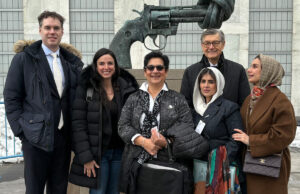The Global Ageing Network hosted an online webinar on May 3 with panelists Meghan Davies, Ph.D.; Vincenzo Paolino, founder and CEO of Almacasa, based out of Switzerland; and Mide Seyi-Ajayi, executive director for Long-Term Care at Baycrest in Toronto. The webinar focused on the person-centered approach and how it can help improve the quality for life for residents of long-term care communities across the spectrum—and the globe.
Davies recent qualitative study, “Tri-National Ethnographic Multi-Case Study of Quality of Life in Long-Term Residential Care,” examined long-term residential care homes in Europe—specifically in Switzerland, the United Kingdom, and the Netherlands—to understand person-centered care practices, and review the similarities and differences.
Davies outlined the second-order constructs sharing commonalities:
- Maintaining dignity, autonomy, and independence
- Knowing the whole person
- Creating a homelike environment
- Establishing a caring culture
- Integrating families, and nurturing internal and external relationships
Synthesis translation then led to the following third-order constructs:
- Personalizing care within routines
- Optimizing resident environments
- Giving residents a voice
Davies found that optimizing resident environments through personalized care and giving residents, staff, and family members a voice resulted in demonstrated “ways in which long-term residential care homes can provide training, which both educates staff and encourages confidence in their own decision-making ability. Additionally, it highlights ways in which changes to the physical and social aspects of long-term residential care homes can facilitate person-centered care practices, which could improve resident quality of life.”
But personalizing care is not easy. It proved challenging in the United Kingdom, where governance was the most restrictive. Further, shrinking staff and increased turnover among staff were consistent in all three countries, making it harder to provide individual attention to their residents.
Does Size Matter?
Paolino and Seyi-Ajayi presented examples of how person-centered care in aged care organizations of both small and large sizes, respectively.
Almacasa offers care ranging from day care to full care in smaller sites, consisting of about 30 residents integrated into urban settings in large buildings. The approach aims to create and maintain a balance between staff and residents. Almacasa aims to create an environment where residents feel at home, providing “an attractively designed private area, lovingly furnished meeting rooms, and a well-kept garden make a home worth living in.” Pets are welcome and visits from family are encouraged. Residents participate in meaningful activities in their daily living (i.e., making dinner and washing dishes).
Paolino introduced seven pillars of well-being during the seminar: identity, connectedness, security, autonomy, meaning, growth, and joy. He explained how this framework is a circular model which allows both the residents and staff the freedom to make choices and create meaningful relationships. The model brings humanistic values to long-term care, moving away from the clinical paradigm.
Baycrest is a global leader in residential living for older adults, health care, research, innovation, and education, with a special focus on brain health and aging. Founded in 1918 as the Toronto Jewish Old Folks Home, it continues to embrace the long-standing tradition of all great Jewish health care institutions to improve the well-being of people in their local communities and around the globe. Baycrest offers a continuum of services to about 470 residents. As a larger organization, there are struggles with regulatory and compliance standards. The COVID-19 pandemic brought quality-of-life standards to the forefront.
Baycrest surveyed families, staff, and residents and used their feedback to change the culture. A few of the glaring issues that emerged from the survey included:
- Residents wanted more autonomy around their daily activities (i.e. when to go to bed)
- Staff did not feel like they had an opportunity to get to know the residents well enough
- Residents wanted more variety in the dining experiences
Baycrest developed a tool called “All About Me” that documented how residents felt and monitored incremental changes. Over the past three quarters, they reported gradual improvements in resident experiences and satisfaction. Baycrest increased the staffing ratio in the evenings because of an investment from the government, thus allowing residents to choose when they wanted to go to bed. Also, a resident food committee was formed to provide input on food choices. Residents created a recipe for a chicken soup that served as a third option. These incremental changes provide a more satisfactory living experience for their residents.





